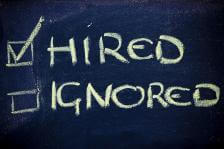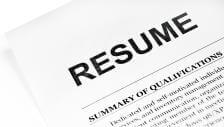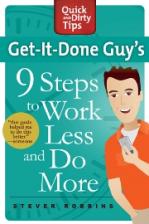How to Write a Great Resume (Part 4)
Creating a resume when changing careers requires a delicate balance of history and transferable skills. Get-It-Done Guy explains how to get it right.

My client Drew is having self-esteem issues over a career change. After 15 minutes spent pulling out results and imagery for resume bullet points, Drew called in a panic. “Help! What results and imagery do I use? I’m changing careers from arc welder to counselor at Grandma Cuddles’ daycare center. Which bullet points do I use?”
“Saw child from across the street at construction site. Yelled ‘look out for that falling hunk of molten… oh. Oh, dear. Never mind. Hey, guys, what’s the number for 911?’” Grandma Cuddles will not be impressed.
Sponsor: Get more things done with your team: get your free 30-day premium subscription of Wrike now.
How do career-changers or new graduates come up with a resume that’s attractive?
Stop Being so Narcissistic! It’s Not About You.
First of all, remember: It’s not about you. Your prospective employer does not care about you and your background. They just want a solution. If you demonstrate the value you bring, your background is secondary. You’ve done your research. You’ve Googled, you’ve talked to your friend who works there. You’ve looked at GlassDoor.com, where you can read real employees discussing their jobs. Forget your background. Just decide what value you can bring, regardless of your background. Emphasize that in your materials and resume.
All Employers Share Certain Needs
What if you can’t find Grandma Cuddles on Google? What if she’s issued no press releases? And when you talk to her current employees, they glance around nervously, look at their watch, and suddenly remember an important appointment elsewhere? Even without information, you still need to show Grandma you’ll be valuable. Or else. Fortunately, all employers share certain needs, and you have skills that address those. These are the transferable skills.
Look for Transferable People Skills
Positions where you interact directly with customers, where you manage customer accounts, where you are responsible for coordinating work with other internal departments, where you are responsible for getting people to work together, or where you manage a team all require good people skills.

- Helping others set goals.
- Uncovering customers’ real needs.
- Managing or calming upset customers.
- Team-building.
- Understanding people’s strengths and helping match people to jobs.
- Coaching and teaching.
- Translating between different languages. For example, being the one person who can intelligently talk to marketing and engineering and help them understand each others’ issues.
- Persuading people.
- Sales or fund-raising skills. If you can raise enough to pay your salary, you will never lack employment!
- Giving powerful, effective presentations.
Look for Transferable Process Skills
People skills are skills you have when face-to-face with people. You may also have process skills, which are about how work gets organized, handed off, and made more efficient. Process skills include:
- Business process reengineering, a fancy term that means “figuring out how to work smarter.”
- Project management. Setting schedules and milestones. Monitoring the action to make sure progress is actually happening.
- Determining what measurements you need to take to run the business. For example, should your retail store be looking at sales per square foot, or sales per employee, or both?
- Taking responsibility. Identifying a project or initiative within a company, and making sure that it runs smoothly.
- Running meetings. Ok, I don’t know how many employers are looking for good meeting-running skills on a resume, but as you know, meetings are my nemesis and I love to see them beaten into submission!
Look for Transferable Strategic Skills
Other transferable skills help you at a strategic level. They show an employer that you are someone they can trust not just to get stuff done, but to figure out what stuff is worth doing. These include:
- Decision-making. Framing decisions. Decision-making under uncertainty. Minimizing risk in uncertain decisions. Decisions that require balancing the needs of many different stakeholders.
- Deep knowledge of a technology. Even if you’re being hired for a different position, sometimes you can bring knowledge that’s valuable to a company. At one point in my career I moved from engineering to training people and designing classes for a technologoy company. I got the training job by telling them, “I understand your product from an engineering perspective better than any other trainer you’ll ever find. Teach me how to train and I’ll bring deep knowledge of the material we’re teaching.” I got the job.
- Likewise, deep knowledge of an industry can be valuable. Even if you’re changing a job function, if you know who’s who in your industry, what the major trends are, and what your competitors are doing, you can be valuable to a company.
Look for Transferable Tactical Skills

Use a Functional Resume
You’ve identified your transferable skills, and now you just need to tell the story that you have those skills. As mentioned in Part 2 of this series, a functional resume organizes your resume around skills, not around time. It’s probably the best way to drive the point home for your prospective employer that you have skills that can be used in your new job, even if it’s different from your last job.
Use a Keywords Section
In addition to your skills, add a keywords section to your resume. People find resumes by searching for keywords. Putting keywords into bullet points can make you sound stilted and generic. So for your online resume, add a keywords section, where you list all the keywords you want people to be able to use to find your resume. I’m not thrilled about keywords as a way to find resumes, but people do it, and you need to make sure you cover all possible avenues.
Now it’s time to change careers! Be like Drew, and pull together your transferable skills: the people, process, strategic, and tactical skills. Wrap them all into a functional resume, and add in a keywords section. Customize your resume, and send it off to Grandma Cuddles. You’ll be amazed at how far you go!
I’m Stever Robbins. I help high-achievers change or accelerate their careers. If you want to know more, visit SteverRobbins.
Work Less, Do More, and have a Great Life!






